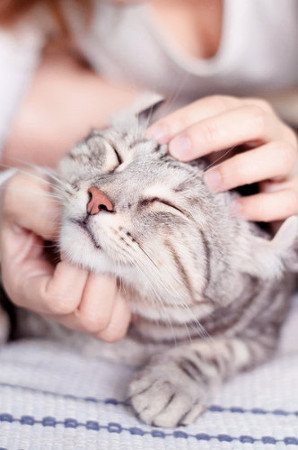Welcoming new pets & pet parents to our practice!
You want the best for your pet's health, especially when you're considering spaying or neutering them. From our top quality veterinary care, to our compassionate and loving team, at Riverbark Veterinary Hospital, exceptional care is the standard we hold ourselves to for our neighbors in the Spring Lake community.
We need to meet you and make sure your pet has everything they need for a successful spay or neuter procedure. Give us a call or book online to schedule an exam today!
Why Should I Spay or Neuter My Pet?
You want to be the best pet parent you can possibly be, and that means making your pet’s health a top priority. The Riverbark Veterinary Hospital team is here to help you by providing the personalized, high-quality care they need. Spaying/neutering your pet…
Contributes to their overall health:
These procedures help prevent unexpected puppies or kittens for both sexes, but did you know there are other health benefits for your pet? For female pets, spaying can help prevent certain cancers and pyometra—a life-threatening uterine infection. For male pets, neutering can also help prevent certain cancers and prostate issues.
Reduces unwanted behaviors:
Choosing to spay your female pet eliminates messy heat cycles and prevents unwanted attention from male pets. Similarly, neutering males not only curbs their urge to roam, decreasing the risk of accidents and fights, but also minimizes territorial marking and aggressive behaviors.
Will save you money in the long run:
Emergency surgery for pyometra, caring for unexpected puppies or kittens, and even buying extra cleaning supplies for marking mishaps can be far more expensive than the one-time cost of spaying or neutering your pet. It's a wise investment that keeps your wallet and furry friend happier in the long run!

At what age should I consider spaying or neutering my dog or cat?
Cats
- Male (weighing at least 2 lbs/0.9kg)
- Neutering male cats before they turn 5 months old can substantially reduce or eliminate male territorial marking, fighting, and roaming.
- Female (weighing at least 2 lbs/0.9kg)
- Neutering female cats before they turn 5 months old can eliminate behaviors displayed when in heat and unwanted pregnancies.
Dogs
- Male
- Smaller dogs (less than 45 lbs when fully grown): neuter at 6 months old
- Larger dogs (more than 45 lbs/20 kg when fully grown): neuter after growth stops around 9-15 months old
- Female
- Smaller dogs (less than 45 lbs when fully grown): spay before first heat cycle (around 5-6 months old)
- Larger dogs (more than 45 lbs/20 kg when fully grown): spay between 5-15 months old
*There are a lot of factors to be considered when choosing the best age to spay or neuter your individual pet and these should be discussed with our veterinarians at your pets first exam.
Book Your Pre-Surgery Exam Now
What to Expect When Spaying/Neutering Your Pet
Pre-Surgery Exam
When you call or book your appointment online, you will schedule a wellness check for your pet. At that appointment, you will discuss spaying or neutering your pet. If you decide that it is the right time for them to have this procedure, our team will provide you with pre-surgery instructions (such as potentially advising you to withhold food and water from your pet the night before their surgery to minimize risks).
Surgery Day
Please bring your pet in at their scheduled time on the day of their spay or neuter surgery so we can get everything set up for their procedure. Our surgical team will gently prepare your pet by shaving a small area on their pelvic/abdominal region and/or their legs. After their surgery, we’ll closely monitor your dog or cat to ensure they are completely comfortable and ready to head home with you.
Post-Operative Care
When you pick up your pet, they may still be a bit sleepy from the anesthesia. Our team will sit down with you to carefully discuss aftercare and give you detailed post-operative instructions to help at home. To support your pet’s recovery, we may provide a protective collar or other method to keep them from bothering their surgery site. While at home, we suggest keeping your pet calm and restricting activities (like running or jumping) for the next few days. If an issue arises, please do not hesitate to contact our Riverbark Veterinary Hospital team - we are here to help make the process as smooth as possible!

Spay & Neuter FAQs
Spaying and neutering your pet has many benefits, and it can be key to your pet living a longer, healthier, and happier life.
What is the difference between spaying and neutering?
Spaying is the surgical removal of a female pet's ovaries and usually the uterus, while neutering is the removal of a male pet's testicles.
Are there any risks associated with spays and neuters?
Like any surgery, spays and neuters come with a small degree of risk, such as reactions to anesthesia or infection. However, our expert veterinarians perform these procedures daily with high success rates.
How long does surgery recovery take?
Your pet will need about 10 to 14 days to fully recover from being spayed or neutered, but they'll likely return to their normal self a few days after surgery.
What happens during spay and neuter surgeries?
In a spay surgery, your vet removes your female pet’s reproductive organs through a small incision in the abdomen. Similarly, neutering involves a small incision to remove a male pet’s testicles. Both are surgeries aimed at keeping your pet healthy and pet population in check.
My pet is older than a year. Does spaying/neutering still offer health benefits?
Absolutely! Spaying and neutering can prevent certain types of cancers and infections no matter the pet's age – it’s never too late to reduce the risk of future health issues!
Will my pet’s behavior change after being spayed or neutered?
After your pet is spayed or neutered, you might notice less marking and roaming. Plus, they generally become less aggressive and more focused on being your loving companion.
About Riverbark Veterinary Hospital
Since 1975, Riverbark Veterinary Hospital has provided comprehensive veterinary care and boarding & grooming to pets in the Spring Lake community and beyond. As a full-service veterinary office, we offer state-of-the-art testing and diagnostics, an array of advanced care, routine and advanced surgical procedures, and many other services to provide your pet with the highest quality care.
Client satisfaction is a top priority at Riverbark Veterinary Hospital and our veterinary team takes great pride in providing every pet with compassionate vet care. We welcome new patients to our office and would be honored to be a partner in your pet's healthcare.

We've upgraded our online store!
Ordering your pet's favorite food and medicine is now easier than ever.
Order Food & Meds
Quick & Easy Registration

Please use the phone number and email you currently use for hospital communications to link your account!
Linked Pet Records & Rx

Your pet's prescriptions and records will be waiting for you!
Pawsome
Savings!

AutoShip discounts, promotions on your favorite products and more!


